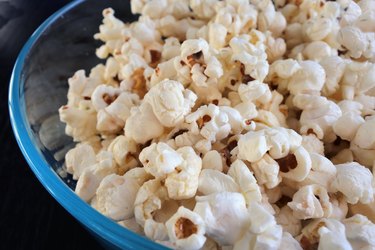
If you love popcorn and have high cholesterol, you may wonder if the tasty treat is a healthy snack and if you should even be eating it. Luckily, you can enjoy it — under certain conditions. Here's the kernel of truth on popcorn and cholesterol and how to make the food part of a healthy diet.
Related Reading
Video of the Day
Understanding Cholesterol
First, it helps to know the basics about cholesterol when you're trying to keep yours in a healthy range.
Video of the Day
Though you may think of cholesterol as a bad thing, the waxy substance is crucial for cellular growth. In and of itself, cholesterol is not necessarily harmful, per the American Heart Association (AHA).
There are two types of cholesterol: one good (HDL) and one bad (LDL). The "good" HDL variety is tasked with scooping up any extra cholesterol coursing through the bloodstream and moving it to your liver, which works to rid it from your body, according to the Mayo Clinic. Having too little HDL can undermine this critical process.
Too much LDL, on the other hand, can clog arteries, upping your risk of developing clots that can result in stroke or heart attack, according to the Mayo Clinic. Translation: Aiming for higher HDL and lower LDL numbers is ideal.
Popcorn and Cholesterol
But is popcorn actually healthy for you when it comes to your cholesterol? When eaten without additives (like salt or butter), popcorn is a heart-healthy winner, according to the Academy of Nutrition and Dietetics (AND). It's 100 percent whole grain, a good source of fiber and low in calories.
In fact, a 3-cup serving of air-popped popcorn contains less than 100 calories, no cholesterol, just a single gram of fat and only 2 grams of sodium, per the AND. Plus, it has 3.5 grams of heart-healthy fiber.
But keep in mind a large bucket of movie-theater popcorn can contains as many as 1,000 calories and pack more than a few days' worth of unhealthy saturated fat, according to the AND. And the microwaveable kind you get at the grocery store isn't so healthy either: It can also be high in fat and calories, thanks to the addition of butter and other added flavorings.
But, thinking outside the bag — the movie theater and microwave bag, that is — popcorn can absolutely be a healthy snack. If you stick to the air-popped and unbuttered variety, "popcorn is a good snack food for people with high cholesterol," says Dallas-based Lona Sandon, PhD, RDN, registered dietitian nutritionist and associate professor at the University of Texas Southwestern Medical Center.
She says popcorn "is a good source of fiber and [is] considered a whole grain. It only has cholesterol when you add butter to it."
If plain popcorn isn't your thing, try oil-popping your popcorn (and going light on the salt if you add any), which keeps you with a low-calorie, low-fat, high-fiber snack, according to the AND.
Other healthier ways to jazz up your popcorn instead of using butter and salt include:
- Chili powder and lime juice
- Parmesan cheese and fresh rosemary
- Cayenne pepper
- Cajun seasoning mix
- Olive oil, garlic and black pepper
- Cinnamon and brown sugar
- Nutritional yeast
Cholesterol and Your Diet
One of the best ways to maintain healthy cholesterol levels is through how much and what type of fat you get in your diet. Avoid or limit saturated and trans fats, which can be risk factors for higher "bad" LDL cholesterol, according to the Mayo Clinic.
"Dietary cholesterol has only a small effect on blood cholesterol," Sandon says. "The type of fat one eats matters more." So, she says, the goal should be to "keep saturated fat lower, while eating more unsaturated fats."
Following a diet that's low in salt and high in fresh fruits, vegetables and whole grains can help prevent high cholesterol, according to the Mayo Clinic. Popcorn — a whole grain — can fit into that type of diet, so long as you limit the salt and butter.
Related Reading
- American Heart Association: “What Is Cholesterol?”
- Mayo Clinic: "HDL Cholesterol: How to Boost Your ‘Good’ Cholesterol”
- Mayo Clinic: “High Cholesterol”
- Lona Sandon, PhD, RDN, LD, registered dietitian nutritionist; associate professor, Department of Clinical Nutrition, University of Texas Southwestern Medical Center; director, Master of Clinical Nutrition Coordinated Program; Dallas, Texas
- Academy of Nutrition and Dietetics: “The Power of Popcorn”
Is this an emergency? If you are experiencing serious medical symptoms, please see the National Library of Medicine’s list of signs you need emergency medical attention or call 911.